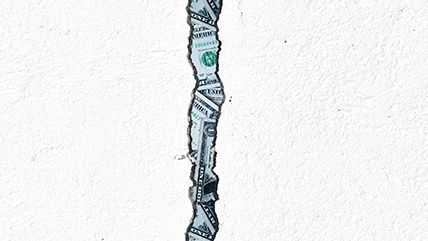A Divided Congress Won't Slow Runaway Spending

Election results are rarely good news for libertarians—or for the economy. The 2018 midterm election was no different.
The Republicans lost the House, an outcome they deserved thanks to their failure to repeal and replace Obamacare, their lack of opposition to President Donald Trump's destructive trade policies and the resulting $12 billion farmers' bailout, and their responsibility for the return of $1 trillion deficits three years ahead of schedule.
Republicans also picked up two more Senate seats, giving them a comfortable majority to confirm new Supreme Court justices and other federal nominees. But even though divided government is generally thought to be good for fiscal restraint, that might not be the case for the next several years. As the late William Niskanen of the Cato Institute demonstrated, the slowest rates of spending growth occur when the president is a Democrat and one or two branches of Congress are under Republican control. That's because when they are in the minority, Republicans suddenly remember how to be fiscally responsible and object to large and rapid spending increases.
Unfortunately, it is unlikely that we will get the reduction in government spending we now need. Trump has repeatedly said he will not touch two of the biggest drivers of our debt, Medicare and Social Security. And on this matter, Democrats are solidly in the president's corner. (While Trump has said he would be willing to cut Medicaid, there is no chance House Democrats will allow him to.)
Is there any silver lining? Maybe a faint one. Maybe.
A Democratic House might block the militaristic instincts usually exhibited by Republican administrations. It might also refuse to approve further military-spending boosts—unless, of course, such spending is offset with nondefense spending on education and infrastructure, or on any other of the Democrats' pet projects.
There's also a serious risk that this administration, under the influence of first daughter Ivanka Trump, will pursue a federal paid-leave mandate. Although such a policy would be detrimental to women—producing lower wages for everyone and, very likely, discrimination by employers against women of child-bearing age—House Democrats would support it.
One big winner of the midterms is cronyism, and in particular the Export-Import Bank (Ex-Im). The president loves doling out favors to large companies such as Boeing and General Electric (which Ex-Im exists to do), especially if he believes that it will prop up U.S. exports. Meanwhile, with the House under Democratic control, the Committee on Financial Services will certainly approve Ex-Im's reauthorization.
That would be a shame. The data collected over the last three years—during which time the bank has functioned at only 16 percent capacity due to a lack of quorum on its board of directors—prove that taxpayers would be better off without it. Ex-Im's annual authorizations declined from $20 billion in 2014 to $3.4 billion in 2017, without reducing U.S. exports. Furthermore, Boeing and other big manufacturers continued to prosper while taxpayers' exposure dropped by about 34 percent.
In 2014, as in most years, 40 percent of the bank's activity benefited Boeing, the United States' No. 1 exporter—a giant company with revenue of $93.39 billion and a market cap of $210 billion in 2017. That percentage plunged to 0.56 percent in 2017 and averaged 27 percent between 2015 and 2017. Meanwhile, small businesses' share of Ex-Im activities increased from 20 percent to 63 percent in 2017. You would think that Democrats would welcome such a change. Instead, they're eager to restore the Boeing Bank to its past glory.
On the bright side, the midterms saw the re-election of the two most libertarian members of Congress: Reps. Justin Amash (R–Mich.) and Thomas Massie (R–Ky.). They can surely be counted on to push their colleagues on both sides of the aisle to resist their baser fiscal temptations. Nonetheless, we're likely in for two years of vitriol and little or no real reform.
This article originally appeared in print under the headline "A Divided Congress Won't Slow Runaway Spending."


Show Comments (24)